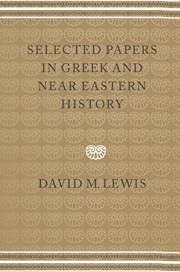Book contents
- Frontmatter
- Contents
- List of plates
- Preface
- Systems of reference
- GENERAL
- ATHENIAN
- NEAR EASTERN
- 31 The Persepolis Fortification Texts
- 32 The King's dinner
- 33 Datis the Mede
- 34 Persians in Herodotus
- 35 The Phoenician fleet in 411
- 36 Persian gold in Greek international relations
- 37 The first Greek Jew
- 38 Review of J. N. Sevenster, Do You Know Greek?
- Bibliography
- Publications of David M. Lewis
- Indexes
36 - Persian gold in Greek international relations
Published online by Cambridge University Press: 15 January 2010
- Frontmatter
- Contents
- List of plates
- Preface
- Systems of reference
- GENERAL
- ATHENIAN
- NEAR EASTERN
- 31 The Persepolis Fortification Texts
- 32 The King's dinner
- 33 Datis the Mede
- 34 Persians in Herodotus
- 35 The Phoenician fleet in 411
- 36 Persian gold in Greek international relations
- 37 The first Greek Jew
- 38 Review of J. N. Sevenster, Do You Know Greek?
- Bibliography
- Publications of David M. Lewis
- Indexes
Summary
No Greek had any doubt that the King of Persia was enormously wealthy. Twelve hundred camels brought him his money, says Demosthenes (xiv.27), in comparing his resources with what fourth–century Athens might produce. The majority of papers for this round–table are concerned with the details of this wealth. I shall be trying to explore some of the ways in which it was used in relation to Greek affairs.
In a famous passage (111.89.3), Herodotus tells us that before Darius there was no regular tribute in Persia; the subjects gave gifts. It was Darius' institution of regular tribute which earned him the designation kapelos. Even in the elaborate tribute–list which came to Herodotus (III.89–97), there is a section devoted to those nations, the Ethiopians, the Colchians and the Arabs, who remained on a nominal gift structure. I do not propose to discuss this in detail, and I shall not be asking whether there was really no tribute in some areas before Darius, whether Herodotus was right in asserting that Persis paid no tribute, whether Herodotus' list represents satrapies or financial districts, or whether it really belongs to the reign of Darius rather than that of, say, Artaxerxes I. My first point, rather, involves the exploration of gifts. ||
Although it did not attract the attention of Marcel Mauss, the master of the subject, the Achaemenid Empire in fact constitutes a textbook case of a gift–centred economy. Gifts were exchanged on a regular basis. Even after the introduction of tribute, it is fairly obvious that individuals and communities continued to make presents to the King of enormous quantity and variety.
- Type
- Chapter
- Information
- Selected Papers in Greek and Near Eastern History , pp. 369 - 379Publisher: Cambridge University PressPrint publication year: 1997



